Maxing Out Card Might be Worth Temporary Credit Score Ding

Dear Speaking of Credit,
I had just signed up and been approved for a credit card with a $300 limit. My credit score is in the mid 500s. The ONLY reason I applied for the card is so I can purchase a laptop for school (nothing fancy, I was thinking one that was around $300-$400). My plan was to use the $300 and then make monthly payments. Now, I'm separated from my husband and am in a better position to make and maintain payments. I don't know much about credit cards and utilization and all that... I've been searching online and people have been saying different things, that maxing out a card is not good for your score even if you make on time monthly payments. And some people say it's OK. Please help me understand so that I do not cause my score to get lower... but if anything, better. I thank you in advance for your time and expert advice.
- Sophanna
Dear Sophanna,
Nice going, getting that new credit card for your computer purchase. Obtaining approval for a new card despite a score in the mid-500s should serve as encouragement to other credit rebuilders who might think there's no hope once your credit seems to have hit the skids.
I share your concern over whether maxing out the card by putting $300 of the purchase on it is a good idea. Accounting for almost 30% of your score, "credit utilization" (credit card balance/limit ratio) is second only to payment history (35%) in the FICO credit scoring hierarchy, with lower utilization leading to higher scores. It's definitely a factor to keep your eye on when looking to raise your score.
In most instances, I would without a doubt recommend against charging a card up to the limit, since this will keep your score from being as high as it could be. Yet I have to say, from what you've described about your personal situation, that I actually like your plan to put $300 of the computer's purchase price on the new card, even though doing so will result in high utilization and is likely to drop your score by even more points than the opening of this new account has probably already done.
How could hurting your score further when it's already low not be counter-productive when trying to rebuild your credit and raise your score? The short answer is that sometimes it's best to take one or two steps back in the short run so you can go further in the long run, and that in credit rebuilding you're running a marathon and not simply around the block. The longer, and more factual, answer follows.
Unlike the payment history category of scoring, where your record of monthly payments leaves a seven-year trail and makes the answer to whether you should pay on time always a resounding yes, credit utilization does not leave such a trail, as the scoring formula only considers your current balances and limits as of the scoring date. In other words, whereas a late payment last month will not be forgotten with an on-time payment this month, last month's utilization, whether high or low, won't be a factor in calculating your current score. This means that you can hang on to your cash right now, knowing you're not jeopardizing your future scores, as long as you make at least the minimum payment on time each month and you're not planning to apply for additional credit anytime soon, which, with a score in the 500s, I wouldn't recommend anyway.
When getting deeply into the weeds of credit scoring, it can often be helpful to remember that a credit score is only important when seeking new credit. I bring this up because, with the credit rebuilding and other personal challenges you're presently facing, it's probably best for your finances and peace of mind to preserve as much cash on hand as you can, while simply focusing on getting those minimum payments in on time each month.
This is not to say that if you have the cash to comfortably bring that balance down sooner you shouldn't do so, since not only can you raise your score a little higher a little sooner, but you'll also pay less interest on the debt. Also, if at all possible, you should plan on minimizing your utilization as much as you can at least a month or two before renting an apartment or financing a car, since your credit score is likely to come into play and every point could matter.
So, if cash is in short supply right now for you, don't worry about the temporary high utilization, or, for that matter, your credit score at all. Just make those payments on time each month without fail, knowing that your score will be working its way back up, slowly but surely, to where you could be looking at a 700 or higher within the next couple of years.
Hope this helps! Best of luck!
See related: FICO's 5 factors: The components of a FICO credit score, Maxed out cards? Don't open another one



















